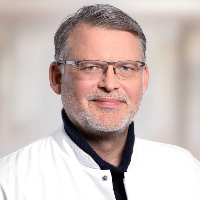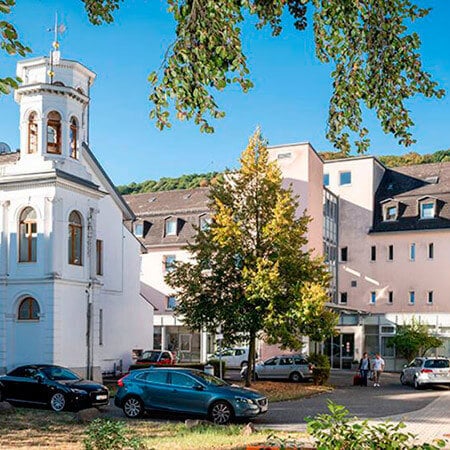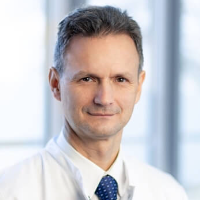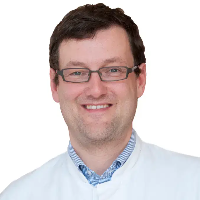Prostate Cancer — Radiation Therapy: treatment in the Best Hospitals of Germany
Treatment prices are regulated by national law of the corresponding countries, but can also include additional hospital coefficients. In order to receive the individual cost calculation, please send us the request and medical records.
Prostate Cancer Treatment in Germany
- Diagnostics
- Prostate cancer | PSMA-PET
- High intensity focused ultrasound (HIFU)
- Brachytherapy
- Transurethral electroresection
- Radical prostatectomy
- Lutetium-177 PSMA (Lu-177)
- Da Vinci prostatectomy
- Intensity-modulated radiation therapy (IMRT)
- Proton Therapy
- Irreversible electroporation (NanoKnife)
- Photodynamic therapy

Department of Adult and Pediatric Radiation Therapy, Radiation Oncology
The Department of Adult and Pediatric Radiation Therapy, Radiation Oncology specializes in all types of modern radiation therapy for the treatment of cancers and pain syndromes. Radiation therapy can be performed before, during or after surgery. In some cases, the department's doctors manage to achieve a positive result only with the help of radiation therapy, and thereby eliminate the need for surgical treatment. Prior to radiation therapy, it is carefully planned using the very latest imaging systems. The department's doctors are highly professional experts and have unique experience, thanks to which they provide excellent medical services.



Department of Radiation Therapy and Radiation Oncology
The Department of Radiation Therapy and Radiation Oncology offers all types of modern radiation therapy for the highly effective treatment of benign and malignant tumors. The department is equipped with three linear accelerators and brachytherapy systems, which provide patients with the safest, most effective, and most sparing irradiation of tissues affected by oncopathology. The department also provides radiotherapy planning and radiosurgery. An ultramodern technical base, exceptional professionalism, and experience of the department's physicians are the cornerstones of successful clinical practice.





Department of Radiation Therapy
According to the Focus magazine, the University Hospital of Ludwig Maximilian University of Munich is regularly ranked among the best medical institutions in Germany! The hospital is the largest multidisciplinary medical facility, as well as a leading research and training center in Germany and Europe. The hospital is proud of its bicentenary history and tirelessly confirms its primacy at the national and international levels. The outstanding quality of medical care is complemented by highly productive research activities, thanks to which many effective diagnostic and therapeutic methods, saving people’s lives, have been presented in medical practice.






Radiation therapy is one of the main treatments for prostate cancer. It is based on the use of radiation, which damages the tumor and causes its death. The cancer cells are more sensitive to radioactive rays than any other tissues in the human body.
Radiation therapy in Germany is carried out using modern technology. They provide high accuracy of the entry of rays into the body, accurately follow the contours of the tumor. If you are undergoing treatment in Germany, the therapy will be more effective and safer, as well as will cause fewer side effects. This country uses the very latest radiation methods, including intensity-modulated and proton therapy.
Types of radiation therapy
The doctors in Germany use several types of radiation therapy to treat prostate cancer, including the very latest techniques, which allow for an increased radiation dose for a tumor, but reduce it for healthy tissues. Such treatment is better tolerated, gives fewer complications and side effects.
Radiation therapy is divided into remote and interstitial. The types of remote radiation are listed below:
Conventional radiation therapy. It is the very first variety of this type of radiation therapy, which is planned using a two-dimensional image. It is cheaper, but less effective and often causes side effects.
Conformal remote radiation therapy. It gradually replaces the conventional type of radiation therapy. The amount of external radiation is no longer standard. It is planned individually. The advantage of conformal radiation therapy is the ability to achieve the best possible correspondence between the volume distribution of the administered dose of external radiation and the configuration of the tumor.
Intensity-modulated radiation therapy. It forms several beams of radioactive rays that pass through different parts of the tumor in different doses. Some tumor nodes can be irradiated more than others. When using this method of radiation therapy, the shape of the therapeutic radiation field is continuously adjusted in the projection of the planned target volume (tumor). The effective irradiation requires the observation of two conditions, namely, patient immobilization and an accurate image of the oncological neoplasm.
Imaging-guided radiation therapy. The image of the tumor is obtained both before the session and during it. This reduces the dose of external radiation to healthy tissues. Accordingly, side effects are less severe. In Germany, doctors apply a modern version of this type of irradiation using a fan beam (tomotherapy). Instead of X-rays, doctors use CT scan, which is a more accurate method of tissue imaging.
Proton therapy. It is the very latest method, which is not implemented in widespread practice due to the high cost. Only a few patients can afford it. Proton therapy uses not radioactive rays, but protons. When passing through the body, they release most of the energy only after they reach the tumor tissue. In addition, protons are directed incredibly accurately: the error reaches tenths of a millimeter. Thus, proton therapy is as effective as the use of radioactive rays, but safer for the patient.
Brachytherapy. It can be high- and low-dose. It involves the introduction of radioactive seeds into parts of the patient's body that are affected by the tumor process. This is an invasive procedure.
Stereotactic radiosurgery. This includes CyberKnife and Gamma Knife treatment for prostate cancer. Nowadays Gamma Knife for prostate cancer therapy is rarely used, as this system is more suitable for the destruction of brain tumors. More modern linear accelerators (i.e. CyberKnife system) are specially designed to treat soft tissue tumors of the diverse localizations, including the prostatic ones. CyberKnife system was approved by FDA as early as 2001; it provides patients with precise and sparing care.
In what cases can irradiation become an option of choice?
In case of prostate cancer, radiation therapy can be used in the following situations:
- Initial stage of non-aggressive prostate cancer. If the tumor is limited to the prostate, does not have a high Gleason score (and this is the majority of clinical cases), the operation can not be performed. The radioactive rays can destroy cancer cells. The studies show that patients have the same survival rate after radiation and surgery. However, radiation therapy is a much more sparing method of therapeutic effect, which does not bear the risks characteristic of the operation and does not require a long recovery.
- Advanced cancer. If the tumor is inoperable (i.e. spreads metastases far beyond the prostate gland), non-surgical treatment methods come to the fore. Radical surgery cannot be performed, since the tumor can no longer be completely removed. Nonetheless, radiation therapy can reduce the size of the tumor, whereas hormone therapy inhibits the growth of the tumor. These techniques allow doctors to increase the life expectancy of a person.
- Cancer recurrence. It happens that after surgery the tumor may develop again. In this case, the doctors will not perform a second intervention, but will use radiation therapy to fight cancer.
Brachytherapy
Brachytherapy is a variant of radiation therapy, in which radioactive seeds are introduced into the patient’s body, directly into the tumor foci. It can be high- and low-dose therapy. In the first case, strong radiation affects a person for a short time. The low-dose brachytherapy involves a lower radiation dose, but has a longer effect.
Low-dose rate brachytherapy
It is more common now. The radioactive seeds are introduced into the body. They most often contain iodine-125 or palladium-103. They are administered into the prostate tissue through thin needles. The injection is performed through the skin of the perineum (between the scrotum and the anus). The seeds are left in the prostate for several weeks or months.
The seeds spread the rays over a very short distance, and therefore they irradiate only the problematic area, but not the entire patient’s body. The doctors usually administer about 100 seeds, but their number depends on the size of the tumor, its degree of aggressiveness and the condition of the patient.
The seeds may not be removed after treatment. They are very small and do not cause discomfort. Over time, the seeds cease to emit radioactive rays, so they do not threaten the health of men.
Low-dose rate brachytherapy can be combined with remote radiation therapy. This is required if the tumor has spread beyond the prostate gland. If it is confined to the prostate, brachytherapy alone is enough for a radical cancer treatment.
High-dose rate brachytherapy
It is not very common. The hollow needles are inserted into the prostate. They include soft nylon tubes inside. The needles will be removed, but the tubes will remain. Iridium-192 or cesium-137 are administered through these catheters. They act only 5-15 minutes. The patient undergoes from 2 to 4 such procedures within 2 days. Each time, radioactive seeds are introduced through catheters and then removed.
Brachytherapy is highly effective in the radical treatment of prostate cancer. In case of low-aggressive cancer, it provides a ten-year disease-free survival rate of more than 80%. Even in case of tumors with a high Gleason score, this figure exceeds 60%.
Side effects
The methods of radiation therapy used in the German medical centers are as safe as possible for the patient due to the fact that the rays enter the body from different angles and concentrate on the tumor. Therefore, healthy tissues are minimally exposed to radiation. Nonetheless, radioactive rays damage normal cells, but not just cancer cells, which can lead to complications and side effects. The main of them are:
Radiation proctitis. This is an inflammation affecting the distal colon. The condition is characterized by blood in the stool, diarrhea and involuntary defecation (in rare cases). This is a temporary phenomenon. The bowel function will be restored after some time. During the treatment period, the patient is prescribed a special diet, which reduces the severity of these symptoms.
Radiation cystitis. It is bladder inflammation. A man often goes to the toilet and has a burning sensation during urination. Blood can often be detected in the urine. These problems are temporary. Over time, the damaged tissue will be restored and the patient will have no manifestations of cystitis.
Urethral strictures. This is cicatricial narrowing of the urethra. Their development is an indication for surgery. The narrowed area will be removed, while the urethra will be sutured end to end.
Urinary incontinence. It is a rare complication. It is much less common after radiation therapy than after surgery. However, the more time has passed after treatment, the higher the risk that a person will experience episodes of involuntary urination.
Erectile dysfunction. It develops in the long term after irradiation. The problem can be usually solved with the help of drugs.
Fatigue. A man feels weak throughout his body. He has reduced working efficiency. This may continue for several weeks or months after the completion of all irradiation sessions.
Lymphedema. It develops as a result of damage to the lymph nodes by radioactive rays. Normally, they provide fluid outflow. The damage to the nodes causes tissue swelling. The edemas are localized in the genital area or lower extremities. Although this complication cannot be completely cured, edema reduction can be achieved with physiotherapy.
To reduce the risk of side effects and complications, it is better to use more modern methods of radiation therapy, even if they cost more. As a result, you can save on the fight against the consequences of treatment, since some complications require the constant use of drugs or surgery.
Treatment in Germany using the services of the Booking Health company
If you want to use the services of doctors from the best German hospitals, the Booking Health company will help you go to Germany to undergo prostate cancer treatment. We provide the following services and benefits:
- Selection of the best German hospital that specializes in cancer treatment using radiation therapy and other methods.
- Reduced cost of treatment due to the lack of overpricing and additional coefficients for foreign patients (your savings reach 50%).
- Establishment of communication directly with a doctor in the German hospital.
- Booking an appointment with a doctor on the most suitable dates for you.
- Preparation of the program taking into account the results of previous examinations.
- Monitoring of all states of the treatment program.
- Monitoring of the cost of procedures, expenditure of funds, return of unspent funds upon treatment completion
- Buying and forwarding of medicines.
- Organization of additional diagnostic, therapeutic or rehabilitation measures in Germany.
- Communication with the German hospital upon treatment completion.
The Booking Health company provides high-quality service. We will help you get a visa, book a hotel, buy airline tickets, arrange a transfer from the airport to the hospital and back. In Germany you will be accompanied by an interpreter and a coordinator.

